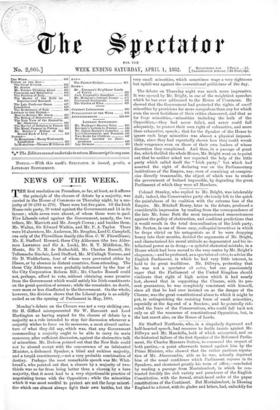Colonel Stanley, who replied to Mr. Bright, was intolerably dull;
indeed, the Conservative party obviously felt to the quick the painfulness of its coalition with the extreme foes of the Empire. Mr. Mitchell Henry, later in the debate, produced a considerable impression by reading from the correspondence of the late Mr. Isaac Butt the most impassioned remonstrances against the policy of obstruction, and confident predictions that it would result in the total demoralisation of the Irish party. Mr. Sexton, in one of those easy, colloquial invectives in which he drops vitriol on his antagonists as if he were dropping honey into their mouths, derided the arguments of Mr. Bright, and characterised his moral attitude as degenerated and his in- tellectual power as in decay,—a spiteful rhetorical mistake, in a House which had been moved to the very centre by Mr. Bright's eloquence,—and he professed, as a spectator ab extra, to advise the English Parliament, in which he had very little interest, to hold to its great traditions. Mr. Dillwyn, protesting that he was not a spectator ab extra, but one passionately eager that the Parliament of the United Kingdom should vindicate that right of high action which it had nearly lost, showed that in supporting the Closure, with its pre- sent guarantees, he was completely consistent with himself, since all that he had ever insisted on as the danger of the Closure, was the great constitutional abuse to which it might be pat, in extinguishing the resisting force of small minorities, especially at the fag-end of a Session ; and he pointedly ridi- culed the fears of the Conservatives, who could fall back not only on all the resources of constitutional Opposition, but, in the last resort also, on the House of Lords.














































